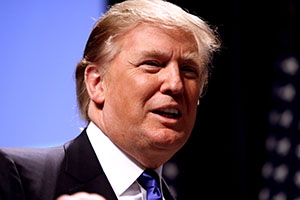Mark Rozell, an expert on executive privilege, opines on the limits of the executive privilege as it applies to President-Elect Donald Trump.
President-Elect Donald Trump’s Numerous Lawsuits
President-Elect Donald Trump is involved in numerous pending lawsuits, including the breach-of-contract suit against celebrity chef and Food Network star Geoffrey Zakarian and several civil cases involving his now-defunct real estate seminar program, Trump University.
One of the Trump University lawsuits is set to go to trial on November 28. In that suit, Donald Trump will confront charges from students in California, New York, and Florida who will say that they were tricked into paying up to $35,000 for real estate seminars.
U.S. District Court Judge Gonzalo Curiel will preside over this trial, which will take place in San Diego. This past summer, Trump accused Judge Curiel of bias because he is Mexican-American and Trump made numerous derogatory comments about Mexican immigrants.
Judge Curiel denied a request by Trump’s attorneys to exclude as admissible evident in the case comments that Trump and his and his team made during his presidential campaign.
Because this case and others may go on after Trump’s inauguration in January, the executive privilege may become a problem.
[UPDATE: Donald Trump agreed to pay $25 million to settle three lawsuits, including two class-actions, against Trump University. As is common in settlements of civil disputes, Trump admitted no wrongdoing.]
The Executive Privilege
The executive privilege refers to the privilege that allows the president and other high officials in the executive branch of government keep certain communications private where disclosing those communications would disrupt to functions or decisions of that branch of government.
According to Mark Rozell, an expert on executive privilege and the Dean of the Schar School of Policy and Government at George Mason University, “Trump and his legal team could try to test the limits of his legal privilege, but I think such a claim would be very shaky. … The precedent suggests that people still deserve their day in court. … As long as [the alleged action] occurred before he is inaugurated.”
Past Attempts at Claiming Executive Privilege
The Supreme Court does not allow the president to use his office and this privilege to shield himself from litigation over actions prior to assuming office. This precedent was set over accusations against then-President Bill Clinton in 1997. At the time, the Supreme Court ruled that Paula Jones’ allegations of sexual harassment against Clinton could be heard, rejecting Clinton’s arguments that his responsibilities as president would prevent him from properly defending himself in a private lawsuit.
President Richard Nixon attempted to claim executive privilege in an effort to conceal incriminating White House tapes. The Supreme Court rejected President Nixon’s claim, but affirmed that the Constitution-based principle of executive privilege was legitimate under appropriate circumstances.
In the unanimous decision, Justice John Paul Stevens wrote, “Although scheduling problems may arise, there is no reason to assume that the district courts will be either unable to accommodate the President’s needs or unfaithful to the tradition — especially in matters involving national security of giving ‘the utmost deference to Presidential responsibilities. … We have confidence in the ability of our federal justices to deal with both of these concerns.”




